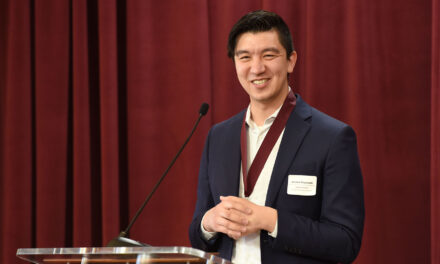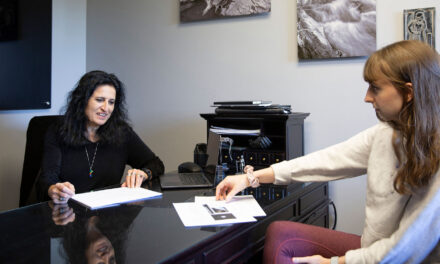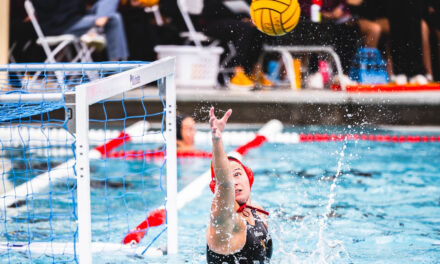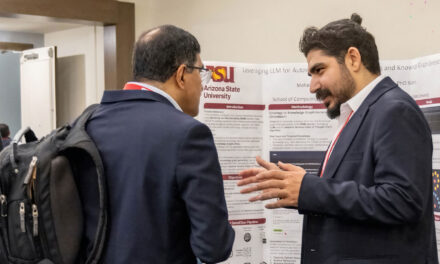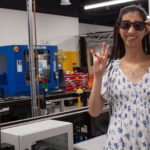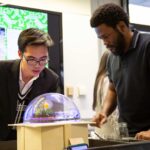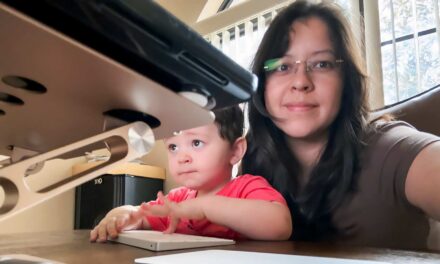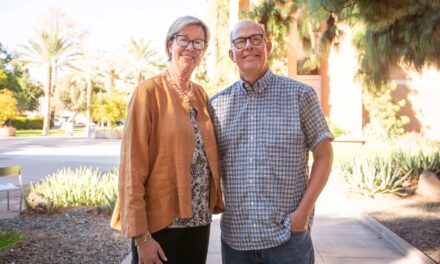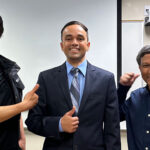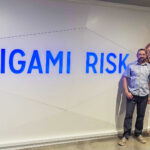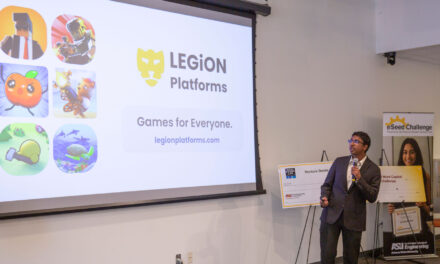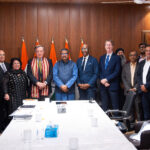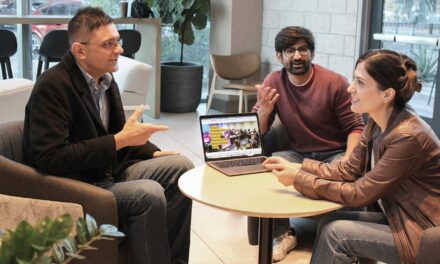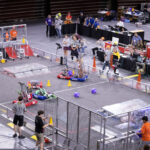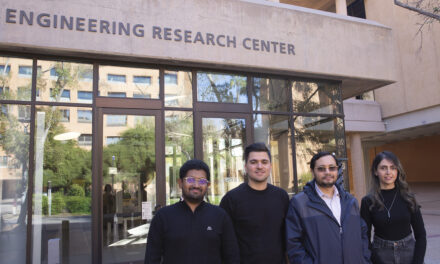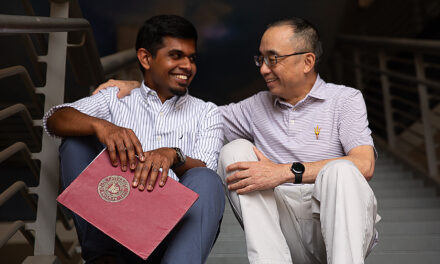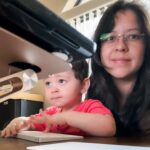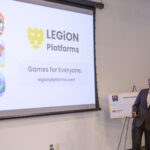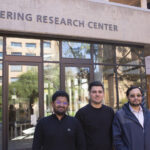
Engineering student inspired by international social entrepreneurship lab
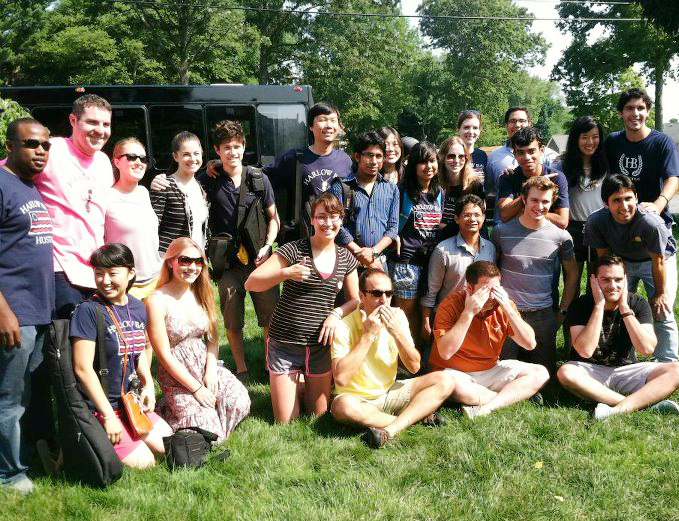
ASU engineering student Mark Huerta (standing far right) poses with students from Europe, Africa, Australia, Asia, South American and the United States he joined at a three-week Social Innovation Lab for some intensive entrepreneurship education.
Posted on August 31, 2012
Arizona State University engineering student Mark Huerta was among a select group of university students from around the world to recently get an immersive introduction to social entrepreneurship from prominent entrepreneurs and investors.
Huerta, a biomedical engineering major in the School of Biological and Health Systems Engineering, one of ASU’s Ira A. Fulton Schools of Engineering, joined 19 fellow students from 14 countries – including Australia and countries in South America, Europe, Asia and Africa – at the Summer Social Innovation Lab.
The students were invited to the three-week gathering at an oceanfront retreat in Massachusetts as a result of their participation in the 2012 Dell Social Innovation Challenge earlier this year.
Sponsored by Dell, the major computer technology corporation, the competition brings together teams of students developing entrepreneurial projects focused on improving the quality of life.
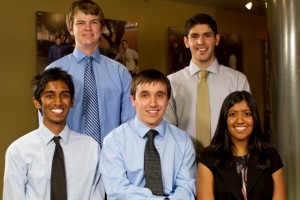
Mark Huerta (standing at right) had the opportunity to participate in an international gathering of student entrepreneurs, thanks to his work with the team of ASU engineering students called 33 buckets. His teammates are (standing at left) Connor Wiegand, (sitting left to right) Varendra Silva, Paul Strong and Pankti Shah. Photo by Jessica Slater/ASU
Huerta is a member of 33 Buckets, a team of ASU engineering students that emerged from the Engineering Projects in Community Service (EPICS) program in the Schools of Engineering.
Team 33 Buckets finished as the top undergraduate team in the Dell Challenge for its project to develop a water-filtering system for a girls’ school in a rural area of Bangladesh.
The system is designed to help provide safe water for the girls and provide the school a source of income from selling surplus decontaminated water in their village.
The idea earned 33 Buckets a $5,000 prize, computers and a camera – and a scholarship for Huerta to attend the Social Innovation Lab.
The lab featured presentations by guest lecturers and one-one-one sessions with more than 40 business and entrepreneurship mentors. There were team-building exercises and workshops focusing on a variety of skill-building themes.
Scott Sherman from the University of California, Los Angeles, led a workshop on effective methods of entrepreneurship. Kate Canales, an accomplished product designer, researcher and project strategist, led a workshop on design principles and strategies.
A workshop on business-plan development was presented by Peter Frumkin, a professor and director of the RGK Center for Philanthropy and Community Service at the LBJ School of Public Affairs at the University of Texas at Austin.
Students were able to learn from leading social entrepreneurs such as Cosmo Fujiyama, one of the lab’s coordinators, who helped start a well-known nonprofit that organized young people to help combat poverty in Honduras. She later joined the New York University Wagner School of Public Service to focus on developing models for youth entrepreneurship and training the next generation of social innovation leaders.
Huerta was fortunate to meet another accomplished social entrepreneur, Gemma Bolos, a Filipina-American teacher who is leading efforts to develop systems to provide safe water at low costs in developing countries – much like the 33 Buckets project.
Near the end of the lab program, students gave presentations on their project to a group of investors from across the country. The investors provided students with advice on how to improve the effectiveness of their projects.
Bulos advised Huerta that 33 Buckets should educate residents of the village in Bangladesh about sanitation and hygiene to help improve their lives beyond offering only the immediate solution provided by the team’s water-filtering system. She talked to Huerta about implementing a 33 Buckets business plan and provided him with educational materials to share with the girls at the school the next time the team visits Bangladesh.
“The mentorship and networking I got out of this lab are great resources. Everyone was so motivated and hard-working. They had a genuine, positive energy and passion that was contagious and inspirational,” Huerta says.
“The most important part of the experience was learning from the other students,” he says. “After the first three or four days, we knew each other really well. It was so much fun to hang out and learn about the other students and their different cultures.”
Written by Joe Kullman and Natalie Pierce
Media Contact
Joe Kullman, joe.kullman@asu.edu
(480) 965-8122
Ira A. Fulton Schools of Engineering


